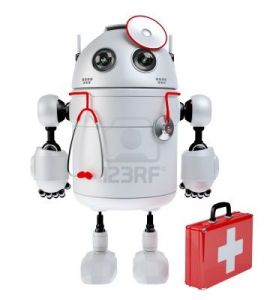Robot doctors: could science fiction become science fact?
31 Oct, 14 | by BMJ
Earlier this month, The Guardian released a video that has given certain sectors of society the heebie jeebies.
The overriding message, that “new technology can destroy jobs”, is not particularly new but previously the jobs at risk were ‘unskilled’. It seems that technology is now so advanced that traditional middle class professions are starting to worry. But are robot doctors, online lawyers and automated architects really becoming a reality?
In 2013, the Associated Press tried to ascertain exactly which professions were being hit hardest by new technology. Through a combination of employment data analysis and expert interviews, they discovered that almost all the jobs that had disappeared in the past few years were not the low-skilled, low-paid roles one might expect, but fairly well-paid positions in traditionally middle-class careers.
In 2012, Silicon Valley investor Vinod Khosla predicted that algorithms and machines would replace 80% of what doctors do within a generation. He argued that much of their current workload (checkups, testing, diagnosis, prescription, etc.) could be done better by sensors, passive and active data collection, and analytics. Expert radiologists are already routinely outperformed by pattern-recognition software, he argues, and diagnosticians by simple computer questionnaires.
XPRIZE, a self-proclaimed “innovation engine”, offers $10m prizes to those inventors who manage to solve some of technology’s most troublesome challenges. One such award will be given to the first team to produce a working “tricorder” – a handheld device capable of diagnosing a set of 15 diseases without the presence of a medical professional. If you think this sounds like something straight out of science fiction, you’d be right. The Tricorder is the multifunction hand-held device used for sensor scanning, data analysis, and recording data by the medical officers in Star Trek. However, it may soon be science fact: the CEO of XPRIZE, Dr Pete Diamandis, expects someone to succeed in the next five years.
He asserts that following this breakthrough, it’ll only be a matter of time before diagnosis is within the primary remit of machines. “It’s a matter of providing the computer with the data. Once it has the data, it’s able to consider thousands or millions of times more parameters than a human can hold in their head.” We will still need medical professionals to guide us and provide the human touch – but doctors will have to accept that computers are better at parts of the job than they are.
It’s not just software and diagnosis, either: surgeons will have to make way for smarter machines. He cites the work of Silicon Valley firm Intuitive Surgical, which has created a “surgical system” named Da Vinci, which an expert surgeon can control online from anywhere in the world.
 This technology is already being put to good use in certain areas of the world. For example, Liu Chunming almost died after a car crash in July in Taihe, a remote county in China’s southeast Jiangxi province, but survived serious abdominal injuries thanks to specialist doctors who led his treatment from 1,000 kms (621 miles) away. From a central “operations room” in the eastern city of Hangzhou, doctors diagnosed and directed treatment for the 48-year-old using live video feeds and software that shares patient scans and files to aid consultation.
This technology is already being put to good use in certain areas of the world. For example, Liu Chunming almost died after a car crash in July in Taihe, a remote county in China’s southeast Jiangxi province, but survived serious abdominal injuries thanks to specialist doctors who led his treatment from 1,000 kms (621 miles) away. From a central “operations room” in the eastern city of Hangzhou, doctors diagnosed and directed treatment for the 48-year-old using live video feeds and software that shares patient scans and files to aid consultation.
“Eventually, where this is going,” says Diamandis, “is that the robot will end up doing the surgeries on its own. I can imagine a day in the future where the patient walks into the hospital and the patient needs, say, cardiac surgery, and the conversation goes something like this: ‘No, no, no, I do not want that human touching me. I want the robot that’s done it 1,000 times perfectly.'”
However, many argue that there are some things that may never be codified or driven into algorithms. Davis Liu, a US-based GP and author, sums this up nicely: “Call it a doctor’s experience, intuition, and therapeutic touch and listening. If start-ups can clear the obstacles and restore the timeless doctor-patient relationship and human connection, then perhaps the future of healthcare is bright after all… I know healthcare can’t simply be solved by smart people in Silicon Valley alone. To solve healthcare we need everyone to collaborate.”
